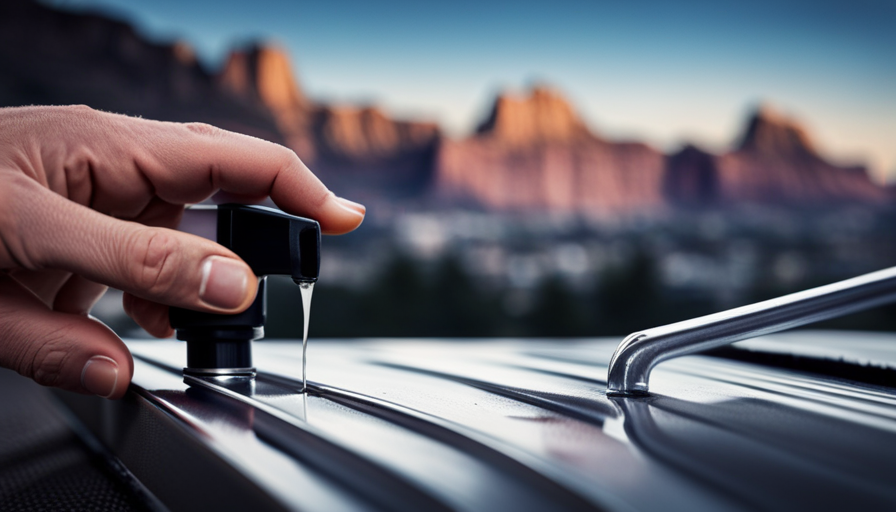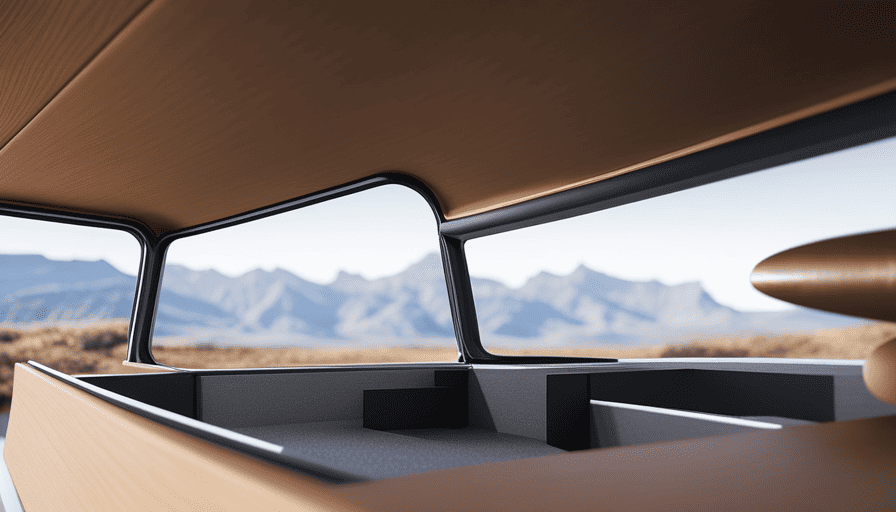Have you ever thought about how long your camper’s battery will hold up?
Well, I’m here to tell you that the answer is not as straightforward as you might think.
The lifespan of a camper battery depends on a variety of factors, such as its capacity, usage, and maintenance.
So, if you want to maximize the run time of your battery and avoid any unexpected power outages during your camping trips, it’s crucial to understand these factors and take the necessary steps to prolong its lifespan.
In this article, I will guide you through the ins and outs of camper battery longevity, from calculating run time to choosing the right battery for your needs.
So, buckle up and get ready to become an expert on camper batteries!
Key Takeaways
- Camper battery lifespan is influenced by factors such as capacity, usage, and maintenance.
- Regular maintenance, including regular charging techniques and cleaning terminals, is crucial for extending the lifespan of a camper battery.
- Lithium-ion batteries are a popular choice for campers due to their high energy density and long lifespan compared to lead-acid batteries.
- Monitoring battery health, including checking voltage and inspecting for damage or corrosion, is important to prevent battery failure.
Understanding Battery Capacity and Usage
Did you know that understanding battery capacity and usage is crucial when it comes to determining how long your camper battery will last? The first thing to consider is the battery charging methods. There are different ways to charge a camper battery, such as using a generator, solar panels, or plugging it into an electrical outlet. Each method has its own charging rate, so it’s important to know which one is best for your battery.
Another factor to consider is the battery discharge rate. This refers to how quickly the battery loses its charge. Different appliances and devices in your camper will consume different amounts of power, so it’s important to be mindful of what you’re using and for how long. Some appliances, like refrigerators or air conditioners, can drain the battery quickly, while others, like LED lights, have a lower power consumption.
Understanding these battery charging methods and discharge rates will give you a better idea of how long your camper battery will last. However, there are also other factors that can affect the lifespan of your battery, such as temperature, maintenance, and the age of the battery. By considering all these factors, you can ensure that your camper battery lasts as long as possible, allowing you to fully enjoy your camping experience without any unexpected power interruptions.
Factors Affecting Camper Battery Lifespan
To maximize the lifespan of your camper battery, it’s important to consider various factors. Extending battery life and troubleshooting battery issues can help ensure that you have reliable power for your camping adventures. Here are four key factors that can affect the lifespan of your camper battery:
-
Usage: The more frequently you use your camper battery, the shorter its lifespan will be. Be mindful of your power consumption and try to minimize unnecessary usage.
-
Charging: Proper charging is crucial for maintaining the health of your battery. Follow the manufacturer’s recommendations and use a suitable charger to prevent overcharging or undercharging.
-
Temperature: Extreme temperatures can have a significant impact on battery life. High temperatures can cause the battery to deteriorate faster, while freezing temperatures can reduce its capacity. Store your battery in a cool, dry place when not in use.
-
Maintenance: Regular maintenance is essential for extending battery life. Keep the battery terminals clean and check for any signs of damage or corrosion. Additionally, ensure that all connections are secure.
By taking these factors into account, you can maximize the lifespan of your camper battery and avoid potential issues. Now, let’s move on to calculating battery run time.
Calculating Battery Run Time
Imagine you’re deep in the wilderness, relying on your camper’s power to keep your devices charged and your appliances running smoothly. Just like a hiker mapping out their trail, calculating battery run time is the key to ensuring you have enough power to fuel your outdoor adventures.
When it comes to calculating battery run time, two important factors to consider are battery efficiency and battery life expectancy. Battery efficiency refers to how effectively the battery can convert stored energy into usable power. This can be influenced by factors such as the type of battery, its capacity, and the devices connected to it.
Battery life expectancy, on the other hand, refers to the total lifespan of the battery before it needs to be replaced. This can vary depending on the quality of the battery, how it is used, and how well it is maintained. By estimating battery efficiency and life expectancy, you can calculate how long your camper battery is likely to last before needing a recharge or replacement.
This knowledge can help you plan your outdoor activities accordingly and avoid unexpected power outages. With that in mind, let’s explore some tips for maximizing camper battery usage and getting the most out of your power source.
Tips for Maximizing Camper Battery Usage
By implementing these strategies, you can ensure that your camper battery remains at optimal performance, allowing you to fully enjoy your outdoor adventures without worrying about power limitations.
To maximize solar power, position your camper in a location that receives the most sunlight throughout the day. Clear any obstructions that may cast shadows on your solar panels, as this can significantly reduce their efficiency. Additionally, regularly clean your solar panels to remove any dirt or debris that may hinder their ability to absorb sunlight.
Reducing power consumption is another key factor in maximizing your camper battery usage. One way to do this is by using energy-efficient appliances and LED lights. These consume less power compared to their traditional counterparts. Another tip is to minimize the use of power-hungry devices such as air conditioners or electric heaters, as they can quickly drain your battery.
Incorporating smart power management practices can also extend your battery life. This includes turning off lights and appliances when not in use, utilizing power-saving modes on electronic devices, and using power inverters that efficiently convert DC power from the battery to AC power for your camper.
By following these tips, you can make the most of your camper battery and enjoy extended power availability during your outdoor adventures.
Now let’s dive into the next section about choosing the right battery for your camper.
Choosing the Right Battery for Your Camper
When searching for the perfect battery for your camper, it’s essential to consider factors such as capacity, size, and durability. One of the most popular options for camper batteries is the lithium-ion battery. These batteries are known for their high energy density, long lifespan, and ability to provide consistent power. Additionally, they are lightweight and compact, making them ideal for campers with limited space.
To help you make an informed decision, here is a comparison table showcasing the key features of lithium-ion batteries and traditional lead-acid batteries:
| Lithium-ion Batteries | Lead-acid Batteries | |
|---|---|---|
| Capacity | High | Moderate |
| Lifespan | Long | Short |
| Weight | Lightweight | Heavy |
| Maintenance | Low | High |
| Solar Power | Compatible | Compatible |
As you can see, lithium-ion batteries have many advantages over lead-acid batteries. They have higher capacity, longer lifespan, and are easier to maintain. Furthermore, lithium-ion batteries are compatible with solar power systems, allowing you to harness renewable energy to recharge your battery while on the road.
Proper battery maintenance is crucial to ensure optimal performance and longevity. By taking care of your camper battery, you can avoid potential issues and maximize its lifespan.
Importance of Proper Battery Maintenance
Taking care of your camper’s battery is crucial for ensuring its optimal performance and maximizing its lifespan. Here are three important battery maintenance tips to keep in mind:
-
Regular Charging Techniques: To maintain a healthy camper battery, it’s essential to follow proper charging techniques. Avoid overcharging or undercharging the battery, as both can lead to decreased performance and reduced lifespan. Invest in a quality battery charger that’s compatible with your camper’s battery type and follow the manufacturer’s guidelines for charging.
-
Monitoring Battery Health: Keep an eye out for signs of a failing camper battery. These may include slow cranking, dimming lights, or difficulty starting appliances. Regularly check the battery’s voltage using a multimeter to ensure it’s within the recommended range. If you notice any significant drops in voltage or other concerning symptoms, it may be time to replace the battery.
-
Preventative Maintenance: Maintaining your camper’s battery goes beyond charging. Clean the battery terminals regularly to prevent corrosion, and make sure they’re tightly connected. Additionally, inspect the battery for any cracks or leaks, as these can lead to damage and reduced performance.
By following these battery maintenance techniques, you can extend the lifespan of your camper battery and avoid common mistakes that can cause premature failure.
Now let’s explore some common mistakes to avoid when it comes to camper battery care.
Common Mistakes to Avoid
One of the most common mistakes to avoid is neglecting regular battery maintenance. Proper battery care is crucial for maximizing its lifespan and ensuring it functions optimally. When it comes to camper batteries, there are a few key battery charging techniques and monitoring battery health practices that every owner should be aware of.
To start, it is important to use the correct charging method for your battery type. Different battery chemistries require different charging voltages and currents. Using the wrong charger can result in undercharging or overcharging, both of which can be detrimental to the battery’s health.
Additionally, regularly monitoring battery health is essential. This can be done by checking the battery’s voltage, specific gravity, and overall condition. By keeping a close eye on these factors, you can catch any issues early on and take the necessary steps to rectify them.
As a helpful visual aid, here is a table summarizing some common battery charging techniques and monitoring practices:
| Charging Techniques | Monitoring Battery Health |
|---|---|
| Use the correct charger for your battery type | Check battery voltage regularly |
| Avoid overcharging or undercharging | Monitor specific gravity |
| Disconnect charger when battery is fully charged | Inspect battery for any damage or corrosion |
By following these battery care guidelines, you can ensure your camper battery lasts as long as possible and functions at its best. Now, let’s move on to exploring emergency power solutions without skipping a beat.
Emergency Power Solutions
Looking for a reliable source of emergency power solutions for your camper? Let’s explore some options that will keep you prepared for any unexpected situations.
When it comes to emergency power, portable generators are a popular choice among campers. These generators are compact, easy to transport, and can provide a significant amount of power to keep your camper running smoothly. They typically run on gasoline or propane and can be used to power appliances, charge batteries, and even run air conditioning units.
Another great option to consider is solar panels. These panels harness the power of the sun to generate electricity, making them a clean and renewable energy source. Solar panels are lightweight, easy to install, and can be mounted on the roof of your camper or set up on the ground. They can provide a steady flow of power to your camper’s battery, ensuring that you have a reliable source of electricity even in remote locations.
So, whether you choose a portable generator or solar panels, having an emergency power solution in place is crucial for any camper. It’s always better to be prepared for unexpected situations.
Now let’s explore some resources for battery replacement and repair.
Resources for Battery Replacement and Repair
You gotta check out these awesome resources for fixing up and replacing your camper’s worn-out battery. When it comes to battery replacement and repair, there are a few key things you need to know.
Here are four important resources that can help you with your camper battery needs:
-
Manufacturer’s Website: Start by visiting the manufacturer’s website for your camper. They often provide valuable information about battery replacement and maintenance. You can find detailed instructions, troubleshooting guides, and even online support forums where you can connect with other camper owners facing similar issues.
-
Battery Retailers: Another great resource for battery replacement is your local battery retailer. They have a wide range of camper batteries to choose from and can provide expert advice on which battery is best suited for your needs. They may also offer battery installation services if you’re not comfortable doing it yourself.
-
Battery Warranty: If your camper battery is still under warranty, be sure to check the terms and conditions. Some warranties cover the cost of battery replacement or repair, saving you money in the process. Contact the manufacturer or retailer to inquire about the warranty coverage and any necessary steps to claim it.
-
DIY Battery Maintenance: To extend the lifespan of your camper battery, regular maintenance is essential. Look for online resources and tutorials that provide step-by-step guides on how to properly maintain and care for your battery. This includes tasks like cleaning terminals, checking fluid levels, and ensuring proper charging.
By utilizing these resources, you can effectively address any issues with your camper battery and ensure it lasts for many more adventures to come. Remember to always follow safety guidelines and consult professionals if you’re unsure about any aspect of battery replacement or repair.
Frequently Asked Questions
Can I use my camper battery to power appliances and devices while the engine is off?
Yes, you can definitely use your camper battery to power appliances and devices while the engine is off. It’s a convenient and reliable option for camping activities. However, it’s important to note that the duration of power will depend on the capacity and condition of your camper battery. Alternatively, you can consider using alternative power sources like solar panels or portable generators to ensure a continuous power supply for your appliances.
How often should I recharge my camper battery?
To extend the life of your camper battery and ensure its optimal performance, it’s important to recharge it regularly. How often should you recharge your camper battery? Well, that depends on various factors such as the type of battery, the usage, and the climate conditions. As a general rule, it’s recommended to recharge your camper battery every few months, even if it’s not in use. Regular recharging helps prevent sulfation and ensures the battery remains in good condition for longer periods.
Can I connect my camper battery to a solar panel for charging?
Yes, you can connect your camper battery to a solar panel for charging. It offers several benefits such as a constant source of renewable energy, reducing reliance on external power sources, and extending the lifespan of your battery.
Solar charging is an efficient and eco-friendly option that allows you to recharge your battery while enjoying the great outdoors. It’s a reliable solution for keeping your camper battery charged and ready for your adventures.
What should I do if my camper battery is not holding a charge?
If my camper battery isn’t holding a charge, there are a few troubleshooting tips I can suggest. Firstly, check the battery connections to make sure they’re secure and clean. If that doesn’t solve the issue, it might be time for battery maintenance. This could involve checking the water levels (if it’s a lead-acid battery), cleaning the terminals, and possibly even replacing the battery if it’s old or damaged. Remember, regular maintenance is key to a healthy camper battery.
Are there any specific safety precautions I should take when maintaining my camper battery?
When it comes to maintaining your camper battery, there are a few essential safety precautions to keep in mind. First, always make sure to wear protective gloves and goggles when handling the battery.
Secondly, never smoke or have an open flame near the battery, as it can produce flammable gases.
Lastly, it’s important to regularly check the battery’s water levels and clean the terminals to ensure optimal performance.
By following these battery maintenance tips, you can extend your camper battery’s life and enjoy worry-free adventures on the road.
Does the Lifespan of a Camper Depend on the Battery’s Lifespan?
The camper lifespan duration highly relies on the lifespan of its battery. A camper’s battery powers various vital systems such as lights, appliances, and heating/cooling. If the battery has a shorter lifespan, it may result in frequent replacement and potential disruptions during camping trips. Therefore, maintaining a durable battery is crucial for an extended camper lifespan duration.
Conclusion
So, there you have it folks! The mystery of how long a camper battery lasts has been unraveled. It’s not just a simple matter of plugging in and forgetting about it. You need to understand battery capacity, consider factors that affect lifespan, calculate run time, and follow some tips for maximizing usage.
And let’s not forget about choosing the right battery and giving it proper maintenance. Trust me, it’s not as easy as it seems. But fear not, because with this knowledge, you’ll be prepared for any camping adventure! Happy trails, my fellow battery enthusiasts!










